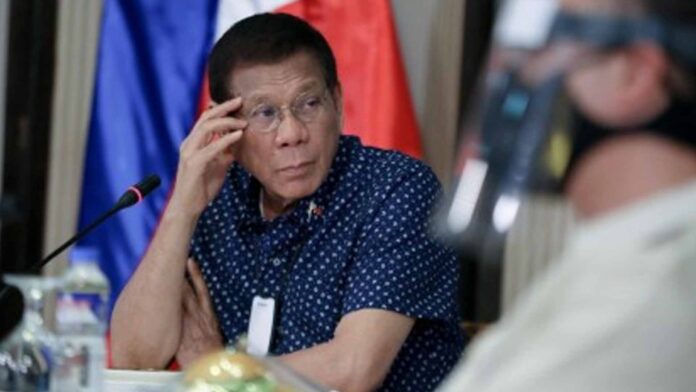President Rodrigo Duterte was asked to extend the implementation of enhanced community quarantine (ECQ) in select areas in Luzon after April 30, Malacañang said.
This developed following Duterte’s meeting with health experts, as well as the members of the Inter-Agency Task Force for the Management of Emerging Infectious Diseases (IATF-EID) on Monday.
In a virtual press briefing aired on state-run PTV-4, Presidential Spokesperson Harry Roque said the recommendation pitched to Duterte was to either “maintain, relax or lift” the ECQ in areas in Luzon with high cases of coronavirus disease 2019 (Covid-19).
“Ang option na lumabas kahapon ay ipagpatuloy, ‘di naman kaya i-relax o di naman kaya completely itigil ang ECQ sa iba’t ibang lugar ng bansa, depende sa dami ng kaso ng Covid-19 (The option being floated yesterday was either continue, relax or completely stop ECQ in other areas in the country, depending on the number of Covid-19 cases),” he said.
Duterte’s meeting with experts from the medical field and IATF-EID members came 10 days before the imposition of Luzon-wide ECQ expires.
The imposition of ECQ in Luzon was supposed to end on April 12 but was extended until April 30 in a bid to curb the spread of Covid-19 infections in the country.
Roque said it was proposed to continue the implementation of ECQ in Metro Manila, Calabarzon (Cavite, Laguna, Batangas, Rizal, Quezon), and parts of Bulacan, considering that there are high Covid-19 cases in these areas.
“It’s not just (Metro Manila). It’s also Calabarzon and portions of Bulacan,” he said.
No final decision yet
Roque, however, clarified that Duterte still has to carefully study the proposals made with regard to the fate of Luzon-wide ECQ.
Roque said Duterte is likewise weighing the pros and cons of the possible lifting or extension of ECQ in some areas in Luzon.
He said Duterte still has until April 30 to come up with a final decision.
“President Duterte will look at the recommendation of IATF. He will look at the recommendation of WHO (World Health Organization) and the recommendation of the experts and then he will make a decision,” Roque said. “Ang sabi po ni Presidente ang kaniyang (The President said his) decision may come today or it may come on April 30.”
More options
Cabinet Secretary Karlo Nograles, in a separate virtual presser, said the IATF-EID members gave Duterte “more options” to consider in deciding on ECQ’s fate.
Duterte, however, told the IATF-EID to have “another round of discussion” on their proposals, Nograles said.
Nograles said the inter-agency task force will hold a meeting on Wednesday for “more extensive discussion” on the fate of ECQ.
“Bawat miyembro ng (Every member of) IATF will continue to look at all of these options and study all of these options,” he said. “We will come back with our panigabong inputs based sa options na yun (We will come back with new inputs based on that options.”
No proposal for ‘total lockdown’
During Duterte’s meeting with health experts and IATF-EID members, there was no recommendation to enforce a “total lockdown,” Roque said.
“Wala pong nag-rekomenda ng total lockdown (No one recommended a total lockdown),” he said.
Roque’s statement came after he earlier said that imposing a total lockdown is an “option,” in case the government fails to “flatten the curve” of Covid-19 cases in the country.
Nograles said the term lockdown was “not in the vocabulary” of IATF-EID.
“IATF is [only using the terms] quarantine, community quarantine, modified or enhanced or general community quarantine. So, we never used the lockdown,” he said.
If a total lockdown is implemented, people will be barred from leaving their homes and public establishments will be closed.
Following WHO advice
Roque said Duterte would make sure that his decision conforms with WHO’s advice to consider several factors before lifting measures imposed to halt the spread of the contagion.
“Ang WHO advice na dahan-dahan dapat ang pagbalik sa normal ay iku-konsidera rin ng ating Presidente (WHO’s advice for a gradual return to normalcy will also be considered by the President),” he said.
On April 10, WHO director-general Tedros Adhanom Ghebreyesus warned that premature lifting of quarantine protocols to fight Covid-19 could lead to a “deadly resurgence” of the new pathogen.
Tedros said countries that seek the lifting of restrictions should check if the transmission is controlled; sufficient public and health medical services are available; and outbreak risk in special settings like long-term care facilities are minimized.
He added that affected countries should make sure that preventive measures in public spaces are in place; importation risks can be managed; and communities are fully aware and engaged in the transition.
Nograles said the five parameters set by the government, which include the “trends in Covid-19 epidemiological curve, the capacity of the health care system, and the social, economic, and security factors,” would also be compared with WHO’s guidelines.
The Philippines has so far reported 6,459 Covid-19 infections, with 428 fatalities and 613 recoveries. (PNA)


